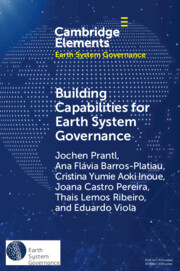58 results
1 - AI for Lawyers
-
-
- Book:
- The Cambridge Handbook of Private Law and Artificial Intelligence
- Published online:
- 21 March 2024
- Print publication:
- 28 March 2024, pp 18-35
-
- Chapter
- Export citation
15 - Indigenous challenges to the capability approach
- from Part III - Social Choice and Capabilities in Action
-
-
- Book:
- Social Choice, Agency, Inclusiveness and Capabilities
- Published online:
- 28 March 2024
- Print publication:
- 14 March 2024, pp 323-355
-
- Chapter
- Export citation
5 - Nudging the capabilities for a sustainable city?
- from Part I - Social Choice and Capabilities
-
-
- Book:
- Social Choice, Agency, Inclusiveness and Capabilities
- Published online:
- 28 March 2024
- Print publication:
- 14 March 2024, pp 85-112
-
- Chapter
- Export citation
1 - Introduction: social choice, agency, inclusiveness and capabilities
-
-
- Book:
- Social Choice, Agency, Inclusiveness and Capabilities
- Published online:
- 28 March 2024
- Print publication:
- 14 March 2024, pp 1-14
-
- Chapter
- Export citation

Building Capabilities for Earth System Governance
-
- Published online:
- 30 January 2024
- Print publication:
- 09 May 2024
-
- Element
-
- You have access
- Open access
- HTML
- Export citation
9 - The Ethics of Power between the Common Good and Equality
- from Part II - Ethical Assessments and Policy Perspectives
-
- Book:
- Power and Inequality
- Published online:
- 04 January 2024
- Print publication:
- 18 January 2024, pp 217-236
-
- Chapter
- Export citation
Sustainable product development in aeroengine manufacturing: challenges, opportunities and experiences from GKN Aerospace Engine System
- Part of
-
- Journal:
- Design Science / Volume 9 / 2023
- Published online by Cambridge University Press:
- 07 August 2023, e22
-
- Article
-
- You have access
- Open access
- HTML
- Export citation
LAYING THE FOUNDATIONS FOR A METHODOLOGY TO INTEGRATE AND MANAGE THE CORPORATE SOCIAL RESPONSIBILITY ISSUES OF A COMPANY IN THE PRODUCT DEVELOPMENT PROCESS
-
- Journal:
- Proceedings of the Design Society / Volume 3 / July 2023
- Published online by Cambridge University Press:
- 19 June 2023, pp. 2415-2424
-
- Article
-
- You have access
- Open access
- Export citation
15 - Education and Democratic Citizenship: Capabilities and Quality Education
- from Part Two - Philosophical and Normative Foundations
-
-
- Book:
- The Cambridge Handbook of Democratic Education
- Published online:
- 20 April 2023
- Print publication:
- 27 April 2023, pp 250-260
-
- Chapter
- Export citation
Social capabilities–based flexicurity for a learning economy
-
- Journal:
- The Economic and Labour Relations Review / Volume 27 / Issue 3 / September 2016
- Published online by Cambridge University Press:
- 01 January 2023, pp. 333-348
-
- Article
- Export citation
Wellbeing economics in public policy: A distinctive Australasian contribution?
-
- Journal:
- The Economic and Labour Relations Review / Volume 30 / Issue 4 / December 2019
- Published online by Cambridge University Press:
- 01 January 2023, pp. 478-497
-
- Article
- Export citation
Animal ethics: the capabilities approach
-
- Journal:
- Animal Welfare / Volume 20 / Issue 1 / February 2011
- Published online by Cambridge University Press:
- 01 January 2023, pp. 3-10
-
- Article
- Export citation
25 - AI-Supported Brain–Computer Interfaces and the Emergence of ‘Cyberbilities’
- from Part VII - Responsible AI Healthcare and Neurotechnology Governance
-
-
- Book:
- The Cambridge Handbook of Responsible Artificial Intelligence
- Published online:
- 28 October 2022
- Print publication:
- 17 November 2022, pp 427-444
-
- Chapter
-
- You have access
- Open access
- HTML
- Export citation
3 - Well-Being Measurement
-
-
- Book:
- Prioritarianism in Practice
- Published online:
- 09 June 2022
- Print publication:
- 21 April 2022, pp 128-171
-
- Chapter
- Export citation
Introduction to the Oliver E. Williamson memorial issue
-
- Journal:
- Journal of Institutional Economics / Volume 18 / Issue 2 / April 2022
- Published online by Cambridge University Press:
- 19 November 2021, pp. 175-180
-
- Article
- Export citation
Enabling Participation Income for an Eco-Social State
- Part of
-
- Journal:
- Social Policy and Society / Volume 21 / Issue 3 / July 2022
- Published online by Cambridge University Press:
- 18 November 2021, pp. 508-519
- Print publication:
- July 2022
-
- Article
-
- You have access
- Open access
- HTML
- Export citation
2 - Non-colonial Military Interventions in Africa
-
- Book:
- African Interventions
- Published online:
- 29 October 2021
- Print publication:
- 11 November 2021, pp 49-84
-
- Chapter
- Export citation
Utilizing the Chinese Diaspora by Russian Firms: Capabilities and Legitimacy Implications
-
- Journal:
- Management and Organization Review / Volume 18 / Issue 5 / October 2022
- Published online by Cambridge University Press:
- 09 November 2021, pp. 892-923
-
- Article
- Export citation
Older people's experiences of dignity and support with eating during hospital stays: analytical framework, policies and outcomes
-
- Journal:
- Ageing & Society / Volume 43 / Issue 7 / July 2023
- Published online by Cambridge University Press:
- 05 October 2021, pp. 1661-1695
- Print publication:
- July 2023
-
- Article
-
- You have access
- Open access
- HTML
- Export citation
12 - A NURTURING AND EMPOWERING STATE
- from Part IV - After the Virus: Who Do We Want to Be?
-
- Book:
- After the Virus
- Published online:
- 20 August 2021
- Print publication:
- 23 September 2021, pp 286-317
-
- Chapter
- Export citation



